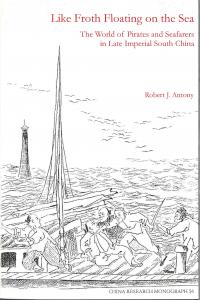Like Froth Floating on the Sea
Like Froth Floating on the Sea
Robert J. Antony
This book explores the world of pirates and seafarers and the integral role they played in shaping maritime society in Fujian and Guangdong during the late eighteenth and early nineteenth centuries. The study is an attempt to understand piracy for what it can tell us about the nature of socioeconomic change in maritime South China during the late imperial age.
As a nonprofit academic press, we need your support to publish our books. Your gift can help us make more of our titles available as e-books. DONATE NOW
Title information
This book explores the world of pirates and seafarers and the integral role they played in shaping maritime society in Fujian and Guangdong during the late eighteenth and early nineteenth centuries. The study is an attempt to understand piracy for what it can tell us about the nature of socioeconomic change in maritime South China during the late imperial age. The approach, what has been called "history from the bottom up," seeks to look at ordinary seafarers and pirates on their own terms and to reconstruct their daily lives and aspirations. By reclaiming their social, economic, and cultural history, the book not only furthers our understanding of maritime society as a whole, but also demonstrates how dynamic economic growth, commercial change, and population explosion promoted dislocation, conflict, and violence on China's southern coast.
Robert J. Antony
Robert J. Antony (安乐博) is Distinguished Professor and Senior Researcher in the Canton’s Thirteen Hongs Research Center, Guangzhou University.
B.A. Louisiana State University in New Orleans; M.A.University of New Orleans; Ph.D. University of Hawaii, 1988
Like Froth Floating on the Sea
List of Tables and Figures – vii
Acknowledgments – ix
Conventions and Equivalencies – xii
1. Prelude: The Empress of Heaven saves Dianbai – 1
2. Waves of Piracy in Late Imperial China – 19
Piracy in Early Imperial China – 21
The Merchant-Pirates of the Mid-Ming – 22
Merchants, Rebels, and Pirates of the Ming-Qing Transition – 28
The Seafarer-Pirates of the Mid-Qing – 37
3. Prosperity and Poverty in Maritime South China – 54
Commercialization and Prosperity – 55
Hardship and Poverty – 71
4. Fishermen, Sailors, and Pirates – 82
Social Backgrounds of Pirates and Victims – 83
Becoming a Pirate ¬– 88
Professional Pirates – 91
Occasional Piracy – 94
Reluctant Pirates and Captives – 97
5. Pirate Brutality and Hegemony – 105
Pirate Modi Operandi – 106 Robbery, Kidnapping, and Rape – 112
Murder, Mutilation, and Dismemberment – 115
Protection Rackets – 118
6. Piracy and Seafaring Society – 122
Pirate Lairs and Black Markets – 122
Wicked People and Worthless Fellows – 129
Pirates, Bandits, and Brotherhoods – 135
Piracy and Local Economies – 137
7. The Cultural World of Seafarers and Pirates – 139
Habits and Lifestyles – 140
Violence and Vice – 144
Lecherous Men and Lewd Women – 147
Mastering the Natural Environment – 150
Worshipping Deities of the Sea – 152
Pirates and Human Sacrifice – 161
8. Conclusion: Maritime History from the Bottom Up – 164
Glossary –173
Bibliography – 176
Index – 194
|
JOURNAL REVIEWS |
|
"In this new study, Robert Antony...has begun to make sense of this little-known seafaring "people without history" and strives to explain why piracy was the logical outcome of China's early modern economy, rather than an exceptional occurrence....Antony argues that the conditions for the piracy crisis of the mid-Qing era were endemic within the seafaring society of China's southeastern coast and represent the crescendo of a golden age of piracy that began in the sixteenth century....The case studies illustrating Antony's thesis, drawn from Qing criminal documents held in Beijing and Taibei, bring to light this marginal people of the maritime." ~Charles Wheeler, University of California, Irvine, in The Journal of Asian Studies (http://www.jstor.org/stable/4133404) |

